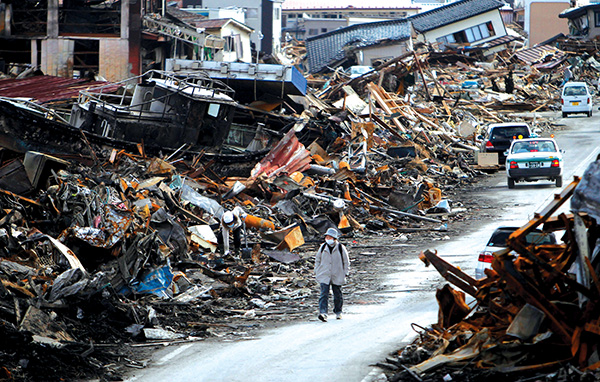
The humanitarian disaster in Japan that began when an earthquake and tsunami struck the country on Friday, March 11 has had aftershocks around the world as people with connections to the country have struggled to cope with the news and band together to help support the victims of the tragedy.
Students at Binghamton University, from those with family in the disaster areas to those simply moved by the tragedy, have united to help Japan during the ongoing crisis.
Megan Wu, who graduated last fall with a degree in business management and art history, is one such student. Wu, who grew up in Japan and came to BU for college, said she heard news of the earthquake from her father on Friday morning while doing some last-minute studying to become an on-campus fitness instructor.
“I did not have time to learn the details that morning, but I kept receiving worrisome comments about Japan from my classmates and teachers throughout the day,” Wu said. “Finally I realized the extent of the earthquake and tsunami. I spent the rest of Friday glued on the Internet watching Japanese news stations.”
Wu said she felt compelled to do something in the wake of the disaster. Along with Japanese peers of hers, she formed the group Save Japan Today to raise money for humanitarian relief.
Daniel Puthawala, a fifth-year student double-majoring in Japanese studies and linguistics and the language coordinator of the Binghamton University Japanese Association, said that BUJA wasn’t sure at first of what efforts it could take to render the greatest assistance. He said BUJA spent the weekend after the tsunami hit Japan trying to figure out the necessary logistics.
“Some Japanese students thought we were being too slow,” he said. “There was a lot of pent up energy and high emotions, so trying to make it into a constructive force was one of our real challenges in that first week. We found out that there was a large, avid group who wanted to do something for relief for Japan but didn’t have the resources to get things done.”
BUJA then joined forces with SJT, helping the new group get organized.
“We helped get all the documents prepared so they could launch their campaign,” Puthawala explained.
Shizuka Fukushima, a Japanese citizen and senior majoring in linguistics at BU, also helped found SJT. She explained that her motivation to fundraise came from a sense of empathy for the suffering of her countrymen and women.
“It is definitely a tragedy to many people involved in the disaster. Many of them have lost lives, homes and properties,” Fukushima said. “I felt that I must do my best to help those people getting out of trouble and rebuilding their homes.”
Puthawala said it was “both a curse and a blessing” that the events in Japan occurred so close to BUJA’s biggest event of the year, Japan Night, which took place April 2.
“We’ve been working the entire year for it. Having the earthquake come right before that was best and worst timing for us. We decided to further the cause on that night, [as] part of our strategy for raising money for the Red Cross,” he said.
According to Fukushima, the joint efforts of SJT and BUJA have raised $2,400 for the Red Cross.
Wu stressed her gratitude for the generosity of her peers.
“We didn’t really have a chance to say thank you — we really appreciate all the students’ donations,” Wu said.
Puthawala said he expects that the groups will continue their efforts.
“We will be doing collections and donation[s] next week, if not the entire semester,” Puthawala said.


